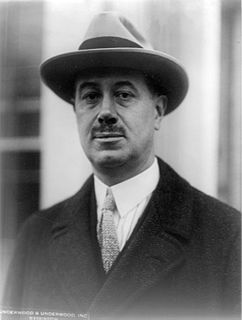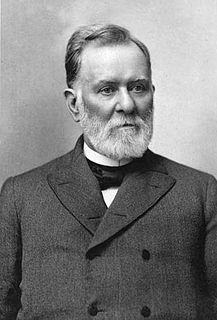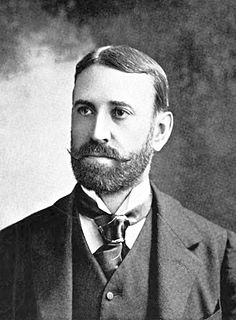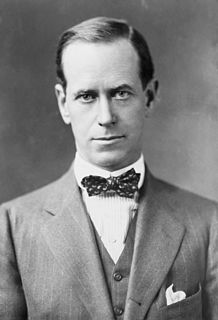
McCormick Place is the largest convention center in North America. It consists of four interconnected buildings and one indoor arena sited on and near the shore of Lake Michigan, about 2 mi (3.2 km) south of downtown Chicago, Illinois, United States. McCormick Place hosts numerous trade shows and meetings. The largest regular events are the Chicago Auto Show each February, the International Home and Housewares Show each March and the National Restaurant Association Annual Show each May.

Cyrus Hall McCormick was an American inventor and businessman who founded the McCormick Harvesting Machine Company, which later became part of the International Harvester Company in 1902. Originally from the Blue Ridge Mountains of Virginia, he and many members of his family became prominent residents of Chicago.

Graceland Cemetery is a large Victorian era cemetery located in the north side community area of Uptown, in the city of Chicago, Illinois, USA. Established in 1860, its main entrance is at the intersection of Clark Street and Irving Park Road. The Sheridan stop on the Red Line is the nearest CTA "L" station. Among the cemetery's 121 acres, are the burial sites of several well-known Chicagoans.

Robert Rutherford "Colonel" McCormick was a member of the McCormick family of Chicago who became a lawyer, Republican Chicago alderman, distinguished U.S. Army officer in World War I, and eventually owner and publisher of the Chicago Tribune newspaper. A leading Republican and non-interventionist, McCormick opposed the increase in Federal power brought about by the New Deal and later opposed American entry into World War II. His death also created what is now the McCormick Foundation, known for its philanthropic activities.

The United States Senate elections of 1924 were elections for the United States Senate which coincided with the election of Republican President Calvin Coolidge to a full term. The strong economy and Coolidge's popularity helped Republican candidates increase their majority by four, although several interim appointments had worsened their numbers since the 1922 election; as a result, the party achieved a net gain of only one seat since the previous voting cycle.

Ruth Hanna McCormick, was an American politician, activist, and publisher. She served one term in the United States House of Representatives, winning an at-large seat in Illinois in 1928. She gave up the chance to run for re-election to seek a United States Senate seat from Illinois. She defeated the incumbent, Senator Charles S. Deneen, in the Republican primary, becoming the first female Senate candidate for a major party. McCormick lost the general election. A decade later, she became the first woman to manage a presidential campaign, although her candidate, Thomas E. Dewey, failed to capture his party's nomination.

Charles Samuel Deneen was an American attorney and politician who served as the 23rd Governor of Illinois, from 1905 to 1913. He was the first Illinois governor to serve two consecutive terms totalling eight years. Notably, he was governor during the infamous Springfield race riot of 1908, which he helped put down. He later served as a U.S. Senator from Illinois, from 1925 to 1931. Deneen had previously served as a member of the Illinois House of Representatives in 1892. As an attorney, he had been the lead prosecutor in Chicago's infamous Adolph Luetgert murder trial.

Leander James McCormick was an American inventor, manufacturer, philanthropist, and businessman and a member of the McCormick family of Chicago and Virginia. Along with his elder brothers Cyrus and William, he is regarded as one of the fathers of modern agriculture due to his part in the development of the McCormick Reaper and what became the International Harvester Company. He also owned and developed vast amounts of real estate in downtown Chicago and Lake Forest, Illinois. In 1885 he donated one of the world's largest telescopes to the University of Virginia.

Robert Sanderson McCormick was an American diplomat. Born in rural Virginia, he was part of the extended McCormick family that became influential in Chicago.

Joseph Medill McCormick, called Medill, was part of the McCormick family of businessmen and politicians in Chicago. After working for some time and becoming part owner of the Chicago Tribune, which his maternal grandfather had owned, he entered politics.

Vance Criswell McCormick was an American politician and prominent businessman from Harrisburg, Pennsylvania. He served as mayor of Harrisburg from 1902 to 1905 and as United States Democratic National Committee chairman from 1916 to 1919. He was appointed chair of the American delegation at the Treaty of Versailles in 1919, under President Woodrow Wilson.
McCormick is a family name that originated in Ireland and then transferred to Scotland. Spelling variations: Cormack, MacCormack, McCormack, McCormick, MacCormick, Carmack, Cormac, Cormach, Cormich and Cormiche. It comes from the first name of the original bearer. A person whose father was named Cormac would identify as Mc Cormac; the combination was continued as the family name by subsequent generations.

Myron McCormick was an American actor of stage, radio and film.

The McCormick family of Chicago and Virginia is an American family of Scots-Irish descent that attained prominence and fortune starting with the invention of the McCormick Reaper a machine that revolutionized agriculture, helped break the bonds of slavery, and established the modern grain trade by beginning the mechanization of the harvesting of grain. Through the McCormick Harvesting Machine Company and later, the International Harvester Company and other investments, the McCormicks became one of the wealthiest families in America. The name became ubiquitous in agriculture starting in the 19th century and the press dubbed the McCormicks the "Reaper Kings". Later generations expanded into media and publishing, finance, and real estate. Various family members were well known as civic leaders. They are descended from an influential leader of modern agriculture, inventor Robert McCormick Jr. (1780–1846), and Mary Ann "Polly" Hall of Steeles Tavern, Virginia.

John Henry Manny (1825–1856) was the inventor of the Manny Reaper, one of various makes of reaper used to harvest grain in the 19th century. Cyrus McCormick III, in his Century of the Reaper, called Manny "the most brilliant and successful of all [Cyrus McCormick I's] competitors," a field of many brilliant people.
McCormick Foundation is a Chicago-based nonprofit charitable trust established in 1955, following the death of "Colonel" Robert R. McCormick of the McCormick family. As of 2010 it had more than US$1 billion in assets.

Maysville is an unincorporated community in Pike County, Illinois, United States.



















